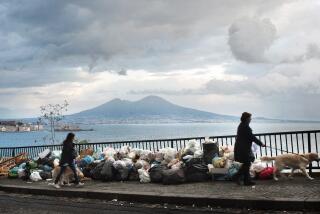Terrorism Ruling Sparks Outcry in Italy
- Share via
ROME — An Italian judge’s ruling that five North Africans accused of sending suicide bombers to Iraq were “guerrillas” and not “terrorists” has ignited outrage here and given rise to a debate over the definition of militancy in times of war.
Politicians across the ideological spectrum excoriated the judge Tuesday, as did some of her colleagues in the judiciary and leading newspaper editorialists. Several of the defendants in the case had been linked by investigators to violent extremists.
“You don’t have to be an Oriana Fallaci to be shocked by this decision,” the La Stampa newspaper said in a front-page editorial, referring to a writer known lately for her anti-Muslim views.
Expressing “rage and disbelief,” Foreign Minister Gianfranco Fini said the ruling represented “a shameless distortion of a reality before the eyes of the entire world.”
Another senior member of the right-wing governing coalition, Fabrizio Cicchitto, called the decision “a major blow to the fight against terrorism.”
The judge, Clementina Forleo, dropped international terrorism charges against the defendants, two Moroccans and three Tunisians, after deciding that their alleged actions did not appear to “exceed guerrilla activity.”
In issuing the judgment Monday night, Forleo accepted prosecution claims that the men were members of Islamic fundamentalist cells in the northern city of Milan and nearby Cremona, and were raising money for “paramilitary structures” in Iraq.
But, citing the United Nations’ 1999 convention on terrorism, she said guerrilla activities in war zones did not become terrorism unless they broke international humanitarian law or were designed to create terror among civilians. There was no evidence the defendants’ activities crossed this line, she said.
She sentenced three of the men to jail terms of up to three years for lesser crimes, including the trafficking of fraudulent identification papers, and remanded the other two defendants to another court for a related prosecution.
Forleo defended her thinking Tuesday.
“It was a difficult decision, but I observed the law and followed my conscience,” she told reporters in Milan. “My conscience is clear.”
Armando Spataro, the top terrorism prosecutor in Milan, said that though he disagreed with the ruling, the case pointed up the difficulty of defining terrorism in the context of military occupations and “wars of liberation.” He and others who stepped up to show solidarity with the besieged judge said that personal attacks on Forleo were inappropriate.
Such treatment “not only undermines respect for the independence of the judiciary but weakens the reaction to terrorism, the strength of which lies in observation of the rules of a fair trial in a democratic state,” the National Assn. of Magistrates said in a statement.
However, Stefano Dambruoso, Italy’s best-known anti-terrorism prosecutor and the country’s legal attache to United Nations crime-fighting agencies in Vienna, condemned the ruling. Suicide bombings, he said, “must always be considered terrorism in every part of the world.”
He said the case, which he helped build before leaving the Milan prosecutor’s office last year, presented evidence that the defendants were recruiting so-called jihadists from Syria to carry out suicide attacks in Iraq.
The defendants are among dozens of Muslim immigrants arrested in recent years on terrorism charges as Italian authorities have detected and cracked cells that have helped plot attacks in Europe and the Mideast.
Two of the five were taken into custody in 2003 in an operation that also seized suspects in Germany and was portrayed at the time as a major break in efforts to trace the way militants are recruited and sent to Iraq from Europe and North Africa.
Another of the five, Drissi Noureddine, was alleged by Italian authorities to have ties to Ansar al Islam, a militant group that operated camps in northern Iraq. Noureddine was one of the defendants remanded to another court.
Italian investigators linked another of the defendants, Mohammed Daki, to the Hamburg cell that plotted the Sept. 11 attacks in the United States. Daki received a 22-month sentence.
Given the weight of the allegations against the men, Cicchitto, the ruling-party official, said Forleo’s decision “gives fundamentalists who are here in Italy to recruit followers the hope of impunity.”
Late Tuesday, Justice Minister Roberto Castelli said he had launched an inquiry into the handling of the case to determine whether Forleo acted out of ignorance or political bias. He warned that Forleo could face disciplinary action.
Since the Sept. 11 attacks, Italy has been using a tougher law that expands the grounds for prosecution of terror suspects or their accomplices.
More to Read
Sign up for Essential California
The most important California stories and recommendations in your inbox every morning.
You may occasionally receive promotional content from the Los Angeles Times.











